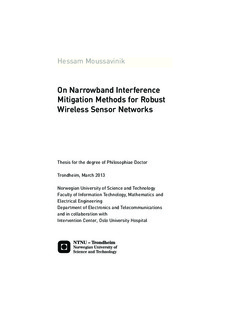| dc.contributor.author | Moussavinik, Hessam | nb_NO |
| dc.date.accessioned | 2014-12-19T13:48:20Z | |
| dc.date.accessioned | 2015-12-22T11:47:51Z | |
| dc.date.available | 2014-12-19T13:48:20Z | |
| dc.date.available | 2015-12-22T11:47:51Z | |
| dc.date.created | 2013-03-20 | nb_NO |
| dc.date.issued | 2013 | nb_NO |
| dc.identifier | 612228 | nb_NO |
| dc.identifier.isbn | 978-82-471-4265-3 (printed ver.) | nb_NO |
| dc.identifier.isbn | 978-82-471-4267-7 (electronic ver.) | |
| dc.identifier.uri | http://hdl.handle.net/11250/2370686 | |
| dc.description.abstract | In this dissertation different approaches to robustness in ultra wideband (UWB) wireless sensor networks, specifically biomedical applications, are studied. UWB wireless sensor networks are unlicensed users of the frequency spectrum and they can be interfered by signals from other licensed users/devices that are generally narrowband signals. Due to the relatively high power of narrowband interferences (NBI) UWB wireless sensor networks can strongly get affected and loose their performance. This problem is addressed in the thesis along methods to make UWB wireless sensor networks robust against NBI.
The discussed methods mainly come in two categories. One category suggests methods for a blind UWB wireless sensor network, and by blind we mean that the network has no knowledge about its proximity and NBI. Signaling schemes, frequency interleaving, scheduling and modulation are discussed in this category. The next category suggests using feedback and keeping the UWB sensor network out of blindness. In this regard a method for enabling feedback in ultra wideband spectrum is studied. It should be mentioned that methods discussed in these two categories can get combined although they are named under two categories.
Results show that in a blind system, multiband signaling scheme with frequency interleaving and support of error correction codes can highly increase robustness of the system against NBI. Looking at multiuser scenario, a scheduling policy that is fair to all users and provides a steady state to the system is found via Nash equilibrium. The proposed modulation shows that it is capable of inherently recovering some errors that occur due to NBI. When it comes to using feedback, the proposed methods, comprising compressed sensing and algebraic detector, provide good advantages regarding complexity and performance.
Thus in a bigger picture, the thesis studies the mentioned problem in UWB wireless sensor networks from different aspects and the proposed methods suggest practical solutions to the problem. Significantly the discussed methods can be combined together to overcome the problem under different conditions. | nb_NO |
| dc.language | eng | nb_NO |
| dc.relation.ispartofseries | Doktoravhandlinger ved NTNU, 1503-8181; 2013:83 | nb_NO |
| dc.title | On Narrowband Interference Mitigation Methods for Robust Wireless Sensor Networks | nb_NO |
| dc.type | Doctoral thesis | nb_NO |
| dc.contributor.department | Norges teknisk-naturvitenskapelige universitet, Fakultet for informasjonsteknologi, matematikk og elektroteknikk, Institutt for elektronikk og telekommunikasjon | nb_NO |
| dc.description.degree | PhD i elektronikk og telekommunikasjon | nb_NO |
| dc.description.degree | PhD in Electronics and Telecommunication | |
